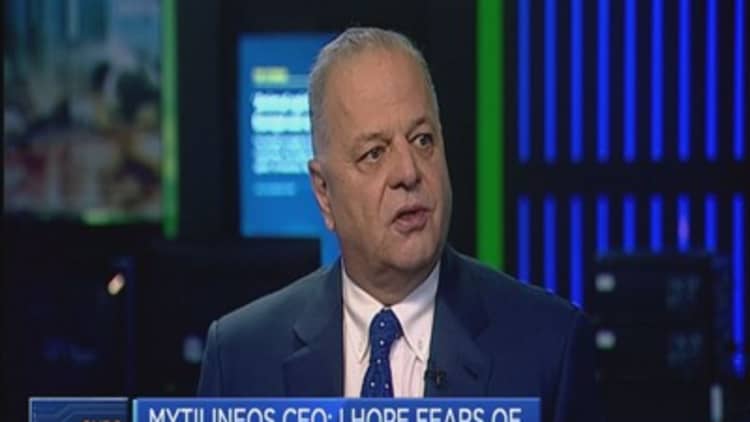Greece's four biggest banks, which suffered severe losses when they were shuttered this summer as the country veered toward economic collapse, must raise nearly $16 billion in new money to withstand any new crisis, the European Central Bank said on Saturday.
The central bank's assessment was eagerly awaited by the financial world as a crucial step in determining how much money the Greek banks would require to achieve stability as the country tries to claw its way out of its deep economic hole.
One of the biggest problems for the Greek banks is the high number of loans to businesses and consumers that are at risk of not being repaid — nearly 50 percent of the loans outstanding.
The central bank report put a figure — 14.4 billion euros, or about $15.9 billion — on what it would take to address the bad-loan problem and enable the Greek banks to operate once again as fully functioning lenders. Without healthy banks to provide the lending and liquidity an economy requires, Greece would struggle to resume economic growth.
Though large, the number announced by the European Central Bank is lower than some experts had feared. And it means that as the banks move to meet their shortfall, it is less likely that bank depositors will be required to take losses. Instead, the money is expected to be raised from bank investors in some combination with funds from the €86 billion package of bailout loans that Greece agreed to this summer with eurozone creditors.

The Greek finance minister, Euclid Tsakalotos, said on Saturday that he welcomed the European Central Bank's assessment. "I am a lot happier today and a lot more optimistic than I was a month ago," he said.
The report by the central bank was the result of its monthslong assessment of the health of the four major Greek banks: Alpha Bank, Eurobank, National Bank of Greece and Piraeus Bank.
Greek banks have been relying on emergency loans from the European Central Bank since Prime Minister Alexis Tsipras was elected in January with vows to end austerity in Greece.
The good news for Greek banks is that, one way or another, the money should be available to make up the bad-loan shortfall.
More from the New York Times:
Greece's Big Challenge: Fix Bad Loans Without Destroying Banks
Greek Lawmakers Clear Way for $2.3 Billion in Bailout Funds
Greece Unveils Tough Draft Budget for 2016
In the bailout package, as much as €25 billion was earmarked for helping the Greek banks cover their bad loans. Because the bailout package is money that the Greek government would eventually have to repay, though, the government is wary of relying solely on that money.
The government has proposed a plan that would require bank shareholders and bondholders to make up at least some of the shortfall before the banks could request public funds. The Greek Parliament approved that plan late Saturday.
The Greek people and businesses have been directly feeling the effects of the banks' problems since the Tsipras government moved to help prop up the banks in July by imposing capital controls.
Those limits were meant to keep people and businesses from draining too much money from the banking system because of fears that the banks might collapse.
Read MoreGreece hikes tourist tickets in revenue bid
As part of those controls, banks capped withdrawals at A.T.M.s at €60 a day, creating hardship for many Greeks already hit by pension cuts, tax increases and other austerity requirements of Greece's international bailouts.
The bad-loan problem is a reflection of the sorry state of the Greek economy. After six years of recession, tens of thousands of Greeks and businesses are unable to make payments on loans taken out for their companies, homes and cars. Nearly half of all loans issued by Greek banks are in arrears — a liability worth an estimated €107 billion. By comparison, in the United States, only about 2 percent of loans are at risk of not being repaid.
In its stress test, the European Central Bank assumed that the Greek economy could remain in recession through at least 2017.
The central bank's assessment found that at least €7 billion more in loans fell into arrears as the economy slumped this summer, on top of the existing amount of bad loans. That added to pressure on banks to raise new capital, which acts as a cushion against losses.
Read More5 political crises hampering Europe's recovery
Piraeus Bank needs €4.9 billion in fresh capital, the central bank found. The National Bank of Greece will need €4.6 billion, Alpha Bank €2.7 billion and Eurobank €2.1 billion.
To raise at least part of the new capital, the banks and the European Central Bank are hoping that private investors will buy Greek bank shares, most of which plunged in value during the summer crisis.
Big American investors who are sharing the pain include the billionaires Wilbur L. Ross and John A. Paulson, whose investment funds made big bets on Greek banks. They have already sustained sizable losses, and they could lose more if bad loans wipe out more bank capital.
The Greek banks have until Nov. 6 to announce how they will raise the money.

